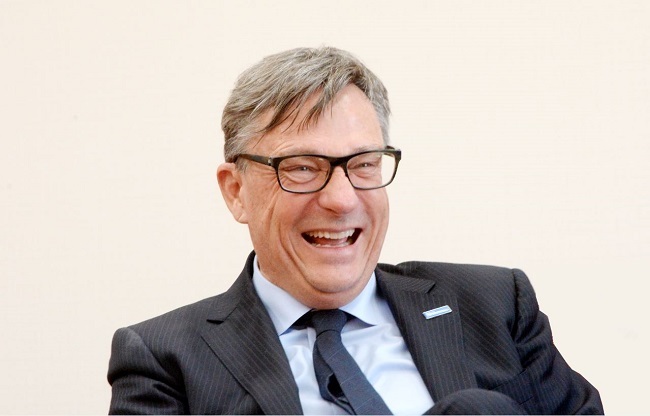In recent years, there has been fierce debate over the value and efficacy of volunteerism as more young students, faced with increasing job scarcity, opt to take on a temporary, nearly-unpaid position in a harsh environment for the sake of earning professional skills and experiences.
But Olivier Adam, executive coordinator of the UN Volunteers, said that despite social and environmental differences in each country, there are “a lot of misperceptions” volunteers give their services without receiving any benefits in return.
 |
Olivier Adam, executive coordinator of the UN Volunteers (Park Hyun-koo/The Korea Herald) |
Volunteer work is the “opportunity to grow” and in fact may be a stepping stone for a real career, an international one in the case of the UN, he said, adding that currently about a quarter of the volunteers manage to land a job at a UN organization.
“A voluntary assignment is not a job in itself, … but during their stay, they still get capacity building, they get training, they get to lean about the UN system, to be exposed to a lot of the work the UN does in that country of assignment, and to network,” Adam said during an interview with The Korea Herald on Wednesday.
“I think it’s an obviously very good avenue for exploring possibilities for the type of career. I really think the skepticism is based on preconceptions and ideas of what it may look like.”
As of 2015, the Bonn, Germany-headquartered UNV dispatches some 6,800 volunteers to 122 countries around the world, with peace, security and humanitarian aid being the main three pillars. They usually have to beat cutthroat competition during the strict selection process and are granted a monthly living allowance, flight tickets, health care and other incentives.
Seoul clinched the partnership with the organization in 1986 and is the second largest donor after Germany, funding programs for specialist, youth and university volunteers. Since 1990 about 120 Koreans have served as UNV volunteers.
At a strategic dialogue on Wednesday, the Foreign Ministry here pledged to boost its financial contributions by 38 percent, doubling the number of volunteers to 30, 30 and 12, respectively. With climate change emerging as a pressing global challenge, the sides will also launch a new project called Green Volunteers Specialists this year, while exploring the possibility to work together on peacebuilding and peacekeeping missions, where the UNV now gives about a third of its entire assignments.
“Korea is one of the biggest partners of the UNV,” Adam said. “But in 2012 there was really a focus from the government to increase the number of Korean volunteers in the system, partially to expose more Koreans to the international system, to support the UN family, and to support the agenda of the Ministry of Foreign Affairs to have more Koreans in international organizations and also to bring Korean expertise in the UN system.”
In addition to the financial commitments, Adam gave credit to Korea for the volunteers’ “strong” commitment and disciplines, noting there has always been more supplies than demand in candidates.
As for Korean students seeking to join the UNV, he stressed the significance of an “open mind” and language skills, especially for non-English regions such as Arabic, Portuguese, and French. Another key is the determination to be “a little adventurous” and take on a certain amount of risks associated with “being outside of your comfort and learning more,” Adam said.
“To be clear, have a personal plan to grow, because what I’ve found including in my career is that one learns a lot about oneself, and that’s also part of the maturing experience at the UNV assignment we provide for you,” he said.
“I think an international assignment gives you the opportunity to learn about a country, the culture and the specifics of the job you’re developing and further technological skills on a practical level, and also obviously to learn about the UN system. In that right frame of mind, I really believe the assignment will be a successful one.”
By Shin Hyon-hee (
heeshin@heraldcorp.com)








